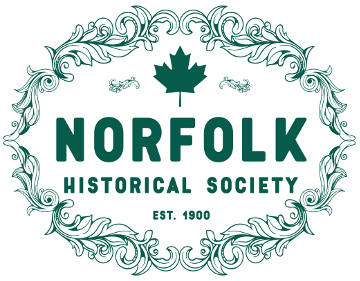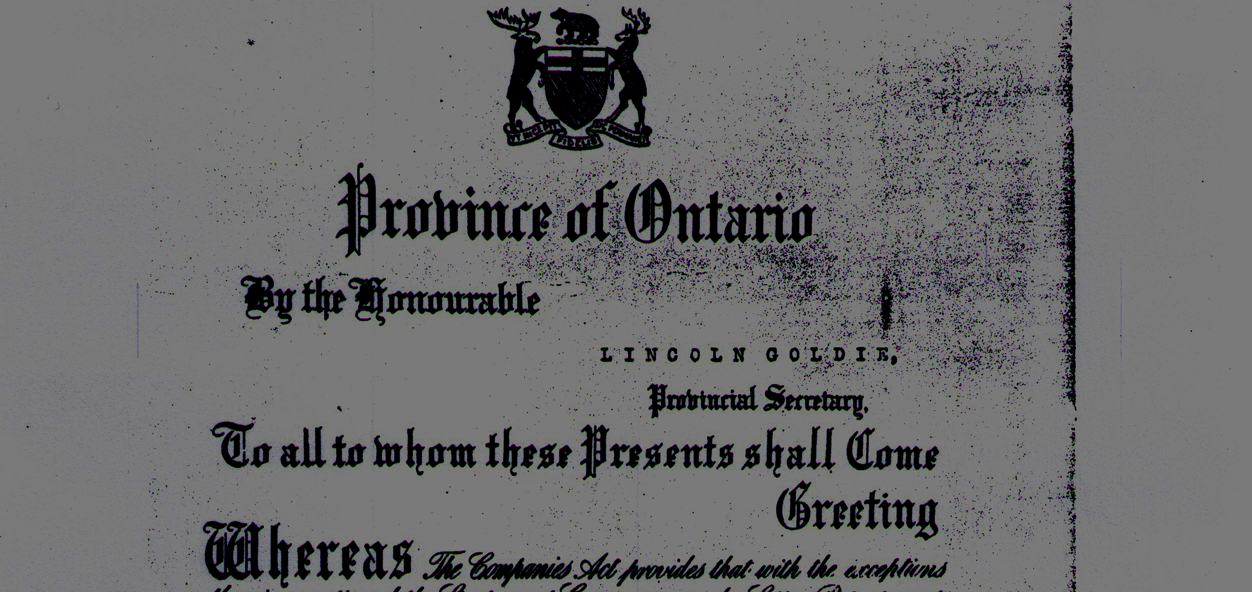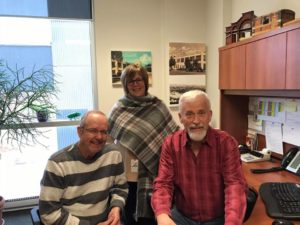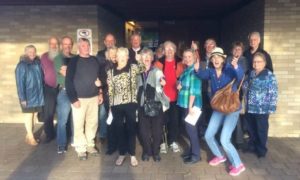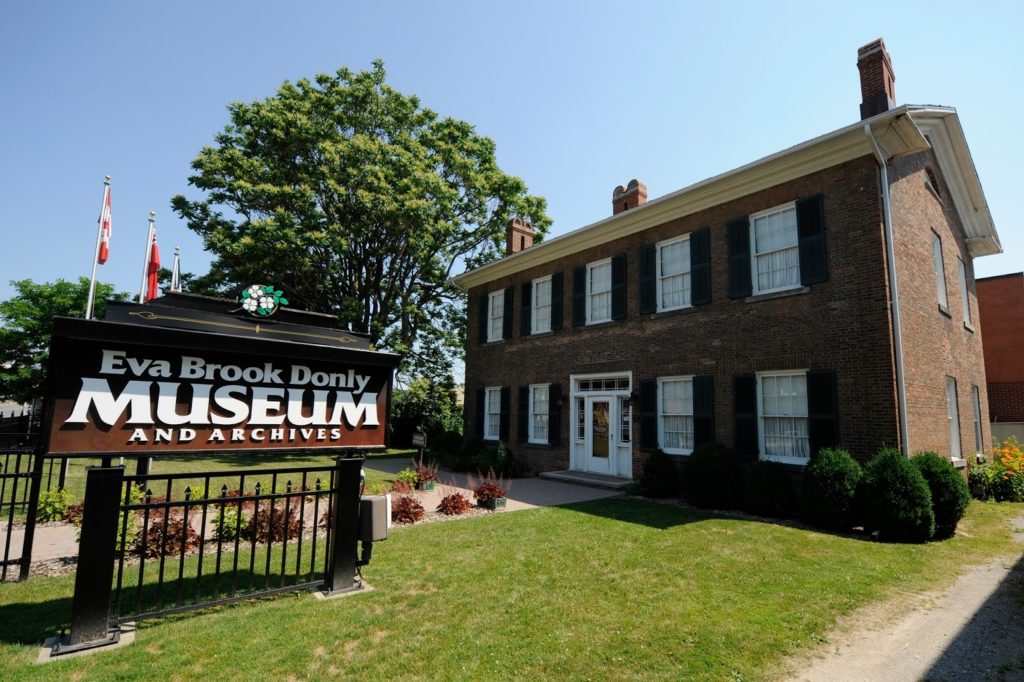The History & Future Of The NHS
While not the oldest still-operating Historical Society in Canada, the NHS comes pretty close. The NHS was founded on February 9, 1900 by Simcoe Reformer Editor Harrison (Hal) Beauregard Donly and a group of prominent Norfolk citizens.
It was created to document the history of Norfolk County and promote Norfolk County’s unique heritage and culture.
Many members of the original Norfolk Historical Society were descended from Norfolk’s first families whose history can be traced to the late 1790s. Their aim was to preserve and promote the history of Norfolk County and its citizens for future generations. Over the Society’s 100+ years of existence, the various Norfolk Historical Society Boards of Directors and its members have not lost sight of this mandate.
After a rocky first year of existence when the NHS had to appeal to the local council for a loan of $25 to keep afloat, the Society gained support financially from not only major industries like American Can and Stelco, but also from prominent Norfolk families and all levels of government. It thrived as membership, grants, and donations increased.
The Society had amassed a massive collection of personal papers, public documents and artifacts dating back as far as 1721. Included in the collection are over 10,000 photographs relating to Norfolk’s history as well as art by Eva Brook Donly and more than 300 paintings by renowned Norfolk artist William Edgar Cantelon. These are housed at the Eva Brook Donly Museum and Archives in Simcoe, Ontario, Canada.
Over its history, the NHS played a lead role in ensuring that the important moments and celebrated individuals in Norfolk’s history have been commemorated, such as Galinee and Dollier’s wintering site in Port Dover, the founding of Simcoe or recognizing the Heroine of Long Point, Abigail Becker, who just happened to be a member of the NHS in 1900.
Until recently, researchers would visit from all over Canada, the United States and even overseas.
In 1941, when Eva Brook Donly passed away, the town of Simcoe accepted the legacy of her home along with an endowment of $10,000 with the interest to be used in upkeep. At that time the Norfolk Historical Society (NHS) was invited to create the museum, and assemble all the relics, paintings and documents that had been housed in the Simcoe Public Library and Registry Office. It was officially opened in June of 1942 – as the first museum in Norfolk County. A full-time curator, reporting to an elected volunteer Board of Directors, managed the Museum and Archives. Over the years, staff expanded to include part-time clerical and custodial employees as well as countless volunteers.
Much of the delivery of programs and services depended upon volunteers,who put in hundreds of hours each year. Responsibility for salaries, programming expenses and the maintenance of the collection was the responsibility of the NHS, which is a registered non-profit organization.
In 1974, the Norfolk Historical Society successfully led the fight to “Save Our Courthouse”, the building in which the Norfolk County Council chambers are presently, as well as the market building which now houses Vallee Engineering across the street. The Alligator Tug would not still exist without the intervention of NHS members. In fact for a while, the NHS owned the alligator Tug until it was donated to County.
Presently, if you walk the Lynn Valley Trail, you will see lovely story boards describing the history of the railroads and industries which used to run along, and were adjacent to, that trail, based on research that was provided by the NHS curator of the Eva Brook Donly Museum.
While the NHS has enjoyed tremendous success with its community and educational mandate, it has struggled – as many charities often do – with generating sufficient revenue through memberships, fundraising and grants to cover its annual operating costs. This has been a particularly difficult challenge over the past several years. Operating shortfalls had become the norm prompting the NHS to investigate its options with regard to its vast archival and artifact collections (and operation of the Eva Brook Donly Museum).
In September 2016, a committee was formed from within the NHS Board to devise a plan to restructure the Eva Brook Donly Museum and Archives in order to restore the NHS to a sound financial position. In spite of the best effort of the NHS Board, volunteers, and staff, the decision was ultimately made to cease operations of the Eva Brook Donly Museum and Archives in January 2017.
But this would not be the end of the Museum or the NHS.
Thanks to the amazingly committed and dedicated NHS volunteers, the Museum reopened on a part-time basis – staffed and operated by the volunteers and NHS Board. This temporary resumption of services for archival viewing and genealogical research allowed time for the NHS Board of Directors to appeal to Norfolk County to transition the ownership of the collections and operation of the Museum over to Norfolk County for a permanent solution to the situation.
What followed was a tumultuous few months of Norfolk County rejecting its initial staff proposal to take over and operate the Eva Brook Donly Museum and Archives under Norfolk County control and budget. This put the NHS in a limbo without Norfolk County financial assistance nor a path forward. Despite this challenge, the NHS – committed to its members and the public – continued to operate nearly entirely on the skills and dedication of its volunteers. With time running out, the community took notice and support from members of the public, media and other historical and charitable organizations across the country swelled. Young Norfolk community (and NHS) member Wesley Wilson launched an online petition campaign that generated nearly 2000 signatures in only a matter of weeks!
After another year of hard work and overcoming so many setbacks, the NHS finally achieved a victory with Norfolk Council voting in favour of taking over the Eva Brook Donly Museum and Archives. On January 11th, 2018, the NHS Board held a special meeting where the NHS membership voted overwhelmingly to accept the Board/County negotiated Transition Agreement which takes place on January 31, 2018.
The original purpose on the NHS was to document and preserve the history of Norfolk County for generations to come. That objective is more important that anything else the NHS does – arguably more important than the NHS itself! By transferring ownership to Norfolk County, the NHS fulfilled its mandate in that area during these challenging times. Norfolk County Heritage & Culture will re-open the Museum on a part-time basis and operate its vast archival and genealogical research collection in service to the public through the hiring of a full-time Archivist and part-time curator.
Meanwhile, the NHS is now free to chart a new course in its history. The NHS will be more focused on the broader history of Norfolk County including all the communities within the County. The current Board of Directors is already hard at work developing an ambitious strategy that will include more public events, historical education and celebration, community outreach, youth engagement, a school scholarship program, student co-op opportunities, social media campaigns, and so much more in the service of preserving, protecting, and promoting the special history of Norfolk County.
